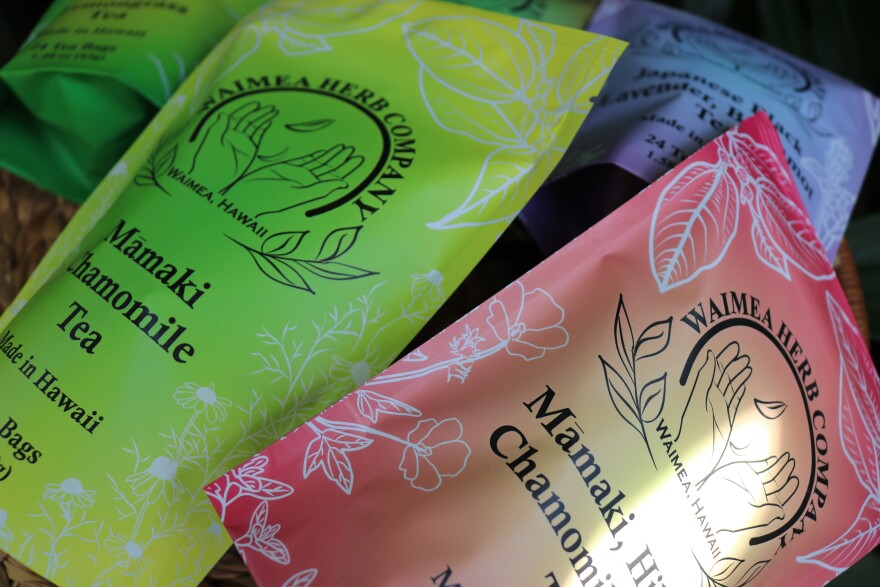Following an outcry from local farmers, Gov. Josh Green announced his intention to veto a labeling bill that would have affected māmaki sold in Hawaiʻi.
As part of a broader, years-long trend to protect local farmers, consumers and the “Hawai'i-grown” label, state lawmakers introduced House Bill 496 and let it sail through this year’s legislative session.
The measure would require consumer packages labeled with "Hawaiʻi-grown māmaki" to contain 100% locally grown “tea or dried leaves,” ensuring that māmaki grown outside the islands isn’t falsely labeled — and priced higher — as locally grown.
The measure was sponsored and supported by local agricultural leaders and organizations, including the state Department of Agriculture.

“The growing demand for Hawaiian māmaki tea as a brand should be protected and promoted. This bill provides māmaki tea the protection afforded to other valuable agricultural crops like coffee and macadamia nuts,” the department said in written testimony from April supporting HB 496.
Māmaki, a shrub-like plant endemic to Hawaiʻi, has achieved commercial success being sold as a herbal and caffeine-free tea, prompting interest in protecting the plant and those who grow it.
In recent years, state lawmakers passed long-awaited labeling bills to protect coffee and macadamia nuts. This year, they also moved a bill strengthening labeling laws for locally caught ahi, or tuna.
Those measures were applauded by local agricultural advocates and producers — but that wasn’t the case with this year’s māmaki measure.
Instead, it prompted concern from local farmers, who said the measure’s language would collapse Hawaiʻi's māmaki industry because it’s primarily sold in packages blended with herbs and spices, which could be excluded from being labeled as Hawaiʻi-grown.
“The intention of the bill was to make sure that people weren't going to mix in fake māmaki or other ingredients to dilute Hawaiʻi-grown māmaki. The issue is that the wording was not specific to that,” said Mālie Sarsona, who co-founded Waimea Herb Company, a Hawaiʻi Island-based business that buys and farms māmaki.
“It just said you can't mix in other ingredients to māmaki and call it māmaki. But the issue is māmaki blends like māmaki lemongrass, māmaki hibiscus — those make up the majority of the market.”
Sarsona also said it’s difficult to grow māmaki outside of Hawaiʻi, so at least for the moment, there’s not really an out-of-state product that necessitates protective measures.
In an April testimony, Tea Chest Hawaii said that 90% of first-time māmaki purchases are blended with other ingredients, and the bill would result in 100% māmaki products that range from $300 to $400 per pound.
That would make it prohibitively expensive relative to blends, which “provide an affordable entry point for consumers to try the ingredient,” it said in its written testimony.
Māmaki farmers want a seat at the table
Before Green announced he would veto HB 496, Sarsona said that companies were already canceling thousands of dollars in māmaki orders from farmers.
Farmers then started reaching out to lawmakers and the governor’s office about their concerns. They were initially told it might be too late to kill the bill, but on June 6, it was one of the 19 measures that Green announced he would veto.
Green said in a statement that the bill “imposes overly strict labeling requirements that could harm small businesses and māmaki producers who responsibly blend leaves from multiple sources.”

The group of local farmers who grow māmaki is small, and Sarsona said none of them were asked to provide input on the measure.
She said once the bill is formally vetoed, farmers will try working with the Hawaiʻi County Council to develop appropriate protections for māmaki products before revisiting state-level legislation — that’s hopefully developed after more input from farmers.
Meanwhile, māmaki farmers continue to look for ways to grow the industry.
The U.S. Department of Agriculture reported that 5,900 pounds of māmaki tea were produced in Hawaiʻi in 2021.
The industry has been lifted largely by the success of Shaka Tea, a Hawaiʻi Island-based company that focused on tea brewed primarily with māmaki.
“The farmers could grow as much māmaki as they wanted, and Shaka Tea would take it and sell it. There was no cap on how much you could sell to them, which was great,” Sarsona said.
But the company, facing financial problems, in December said it would be closing after a few months.
Sarsona said demand for māmaki tea has actually grown since Shaka Tea wound down operations, and that the goal now is to find more buyers.







